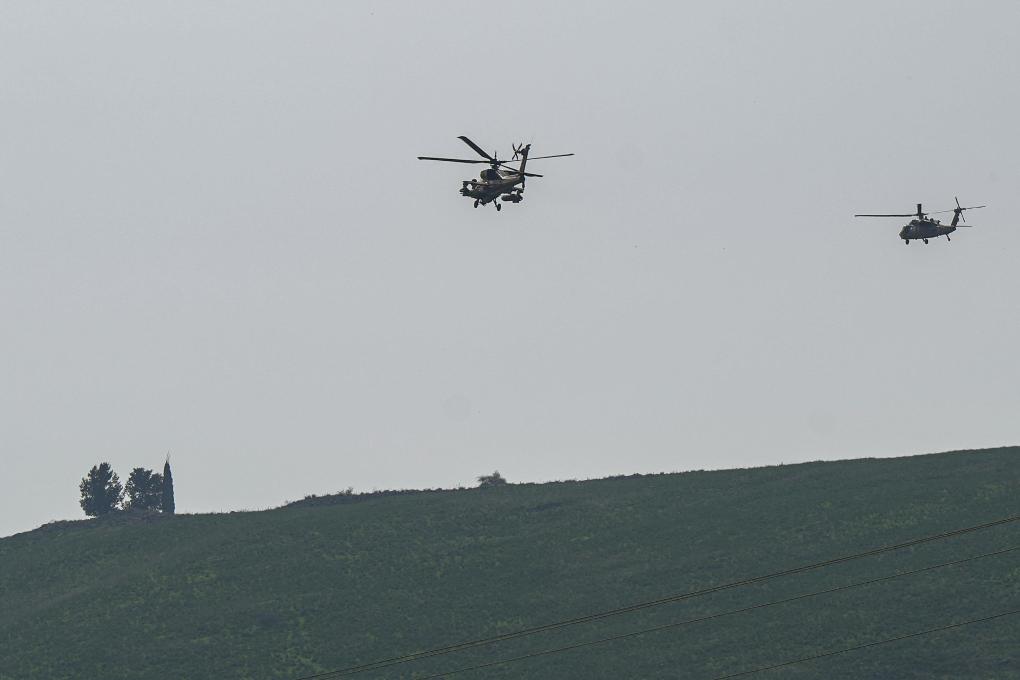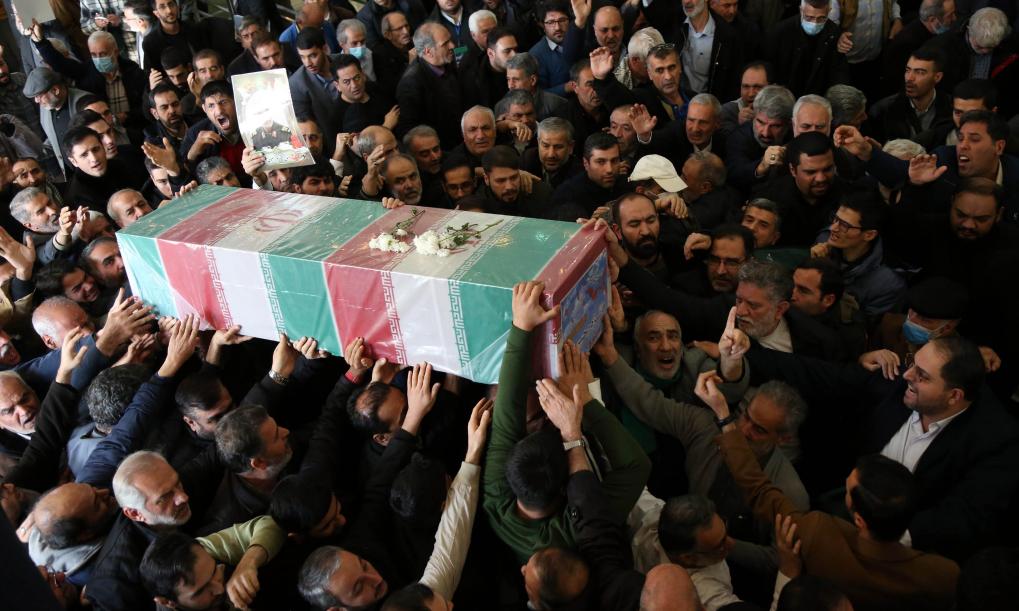International observation | The spillover of the Palestinian-Israeli conflict continues, and the situation in the Middle East is tense
    Xinhua News Agency, Baghdad, January 18th Title: The spillover of the Palestinian-Israeli conflict continues, and the situation in the Middle East is tense.
    Xinhua News Agency reporter Duan Minfu
    Recently, the situation in many places in the Middle East is tense. The United States and Britain successively bombed the targets of Houthi armed forces in Yemen and retaliated against Houthi armed forces for attacking cargo ships in the Red Sea waters; Iran launched missiles to cross-border attack the targets of "terrorist organizations" in Pakistan and other countries and Israeli intelligence agencies in Syria, causing dissatisfaction among neighboring countries; The continuous exchange of fire between Israel and Hezbollah in Lebanon, and the attack and death of a senior commander of Hezbollah have escalated the tension between the two sides.
    Analysts pointed out that the US military attack on Houthi armed forces will only make the shipping problem in the Red Sea more difficult to solve. Tensions between Iran and neighboring countries have increased regional instability. The conflict between Israel and Hezbollah in Lebanon may be protracted. All these reflect that the spillover effect of the Palestinian-Israeli conflict is spreading.

    This is an Israeli helicopter over the northern border of Israel (photo taken on January 8). Xinhua News Agency (photo by Aillard Margolin/Gini Photo Agency)
    The United States and Houthi armed forces are constantly fighting
    According to Masila TV, which is controlled by the Houthi armed forces in Yemen, the United States and Britain attacked several Houthi armed targets in northern and central Yemen in the early morning of 18th, which were located in several locations in five provinces, namely Hodeidah, Taiz, Samar, Beida and Sada.
    Since the outbreak of the current Palestinian-Israeli conflict, Yemeni Houthi armed forces have frequently attacked ships associated with Israel and the United States in the Red Sea to show their support for Palestine. The United States and Britain began to counterattack by launching air strikes against the targets of Houthi armed forces in Yemen on the 12th. On the 17th, the US government also announced that it would re-list the Houthi armed forces in Yemen as a "specially recognized global terrorist" entity, thus putting pressure on the Houthi armed forces.
    Sullivan, Assistant to the US President for National Security Affairs, issued a statement saying that the US move will further restrict Houthi’s armed forces from entering the financial market and hold them accountable for attacking merchant ships traveling to and from the Red Sea and the Gulf of Aden. If the Houthi armed forces stop attacking, the United States will immediately reassess this decision.
    However, analysts pointed out that the US counterattack is not only difficult to exert pressure on Houthi armed forces, but may also lead to further escalation of the situation in the Red Sea. To solve the problem of shipping safety in the Red Sea, the most important thing is to promote the Palestinian-Israeli ceasefire as soon as possible.
    Abdel-Salam, a spokesman for the Houthi armed forces in Yemen, said that the decision of the United States was entirely for political purposes, which had "no real impact" on the Houthi armed forces, but would strengthen their "determination to support the Palestinian people". Yemeni political analyst tamimi pointed out that the Houthi armed forces have been facing a blockade for a long time, so the sanctions brought by the United States listing the Houthi armed forces as a terrorist organization have limited effect.
    Regarding the air strikes by the United States and Britain, according to Michael Naitz, a researcher at the Washington Institute for Near East Policy, this move may be counterproductive, because it will give the Houthi armed forces more reasons to launch attacks. Barbara Slevin, an expert on Middle East issues at Stimson Center, an American think tank, also believes that the US-British air strikes can’t solve any problems. "What is most needed now is to promote a ceasefire in Gaza.".
    Tensions between Iran and neighboring countries have intensified.
    Pakistan’s Ministry of Foreign Affairs issued a statement on the 18th, saying that Pakistan had carried out a series of precise attacks on the "terrorist" hideouts in Sistan-Baluchistan province in southeastern Iran, killing many "terrorists". According to Iranian media reports, seven foreigners were killed.
    Affected by the Palestinian-Israeli conflict, the unstable situation in the Middle East and its surrounding areas has intensified recently. Recently, Iran launched missile strikes against targets it identified as threatening Iran’s security in Syria, Iraq and Pakistan and Israeli intelligence agencies, which triggered strong dissatisfaction among relevant countries.
    The Iraqi Foreign Ministry issued a statement on the 16th, condemning the Iranian attack as a "flagrant violation" of Iraq’s sovereignty. The Iraqi government subsequently recalled its ambassador to Iran and lodged a complaint with the United Nations about the attack. Pakistan’s Foreign Ministry announced the recall of the country’s ambassador to Iran on the 17th, and announced on the 18th that it had carried out a precise military strike against "terrorists" in Iran.

   On January 5, in Tehran, Iran, people attended the funeral of the victims of the explosion attack in Kerman. Xinhua News Agency reporter Shadati photo
    Analysts pointed out that the main reason for Iran’s cross-border crackdown in recent days is the sharp deterioration of the security situation in the Middle East after the outbreak of a new round of Palestinian-Israeli conflict. Iran was bombed by the extremist organization "Islamic State" a few days ago. This time, it repeatedly shot and intended to show its determination to safeguard national security and respond to hostile actions.
    Wang Guang, secretary-general of the Council of China-Arab Reform and Development Research Center, believes that many cross-border attacks and several "third-party areas" are in a tense situation, reflecting that the spillover effect of the Palestinian-Israeli conflict is continuing to spread.
    Israel and Hizbullah have been fighting incessantly.
    After the new round of Palestinian-Israeli conflict broke out, Israel exchanged fire with Hezbollah in the north, which supported Palestinian Islamic Resistance Movement (Hamas). Since this month, Israel has killed many senior leaders or commanders of Hezbollah in Hamas and Lebanon. On the 2nd, an Israeli drone attacked Hamas’s office in the southern suburbs of Beirut, killing six people, including Saleh al-Arouri, vice chairman of the Political Bureau of Hamas. On the 7th, Israeli troops killed Wissam Taweel, a senior commander of Hizbullah, on the Israeli-Lebanese border. On the 9th, the Israeli army killed another senior commander of Hizbullah, Ali Hussein.
    Analysts pointed out that from the commander level of the attack, it can be seen that the military conflict between Israel and Hezbollah in Lebanon is escalating. Israel used its intelligence and technological advantages to "precisely remove" the top leaders of Hizbullah, with the aim of cooperating with the Israeli military operations in Gaza and rebuilding its intelligence deterrence.
    Hezbollah retaliated against Israel’s actions, including attacking the headquarters of Israel’s Northern Command with drones. Ayal Pinko, a senior researcher at the Bei Jing-Sadat Center for Strategic Studies in Israel, believes that Hizbullah will not give up in the face of Israel’s precision strike.
    Lebanese media "Oriental-Today" quoted Hezbollah insiders as saying: "This will be a long battle, a war of attrition that requires patience." (Participating in reporters: Wang Shang, Xie Hao, Ji Ze, Cheng Shuaipeng, Zhang Tianlang, Lu Yingxu, Sha Dati, Li Jun)